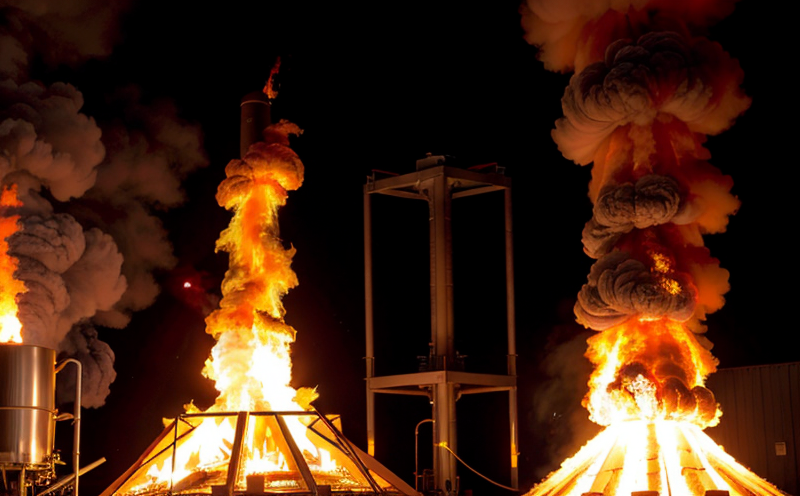ASTM D3801 Flammability Testing of Plastics by Vertical Burning
The ASTM D3801 standard is a crucial method used for assessing the flammability properties of plastics, particularly those intended for use in environments where fire safety is paramount. This testing procedure evaluates how materials perform under controlled flaming conditions to determine their potential to contribute to or resist flame spread.
The test involves subjecting specimens of plastic materials to a vertical flame for a specific duration and observing the behavior after removal from the flame source. The results provide valuable information on the material's self-extinguishing properties, which is essential in various industries such as automotive, aerospace, electronics, and consumer goods.
The ASTM D3801 test is not only important for ensuring compliance with international safety standards but also plays a critical role in product design and development. By understanding the flammability characteristics of plastics, manufacturers can make informed decisions about material selection, formulation optimization, and process improvements to enhance product safety.
One key aspect of ASTM D3801 is the use of carefully controlled parameters that simulate real-world conditions where plastic materials might be exposed to fire hazards. These parameters include the flame height, duration, and the type of flammable gas used (usually propane). The test setup ensures consistent results across different laboratories, making it a reliable method for quality assurance.
Another important feature of ASTM D3801 is its ability to provide detailed data on various performance metrics such as time to ignition, time to extinguishment, and char length. These metrics offer insights into the material's resistance to flame spread and self-extinguishing properties, which are critical for evaluating fire safety.
The testing procedure also involves precise specimen preparation, ensuring that each sample is representative of the intended end-use product. This includes considerations such as thickness, surface area, and orientation relative to the flame source. Proper specimen preparation ensures accurate and consistent test results, which is essential for reliable data interpretation.
The ASTM D3801 method has been widely adopted in industries where material flammability is a significant concern. By adhering to this standard, manufacturers can ensure that their products meet stringent safety requirements and contribute to reducing the risk of fire incidents. The test results are often used as part of broader quality control processes, helping companies achieve higher levels of product safety and compliance.
Moreover, ASTM D3801 testing provides a standardized approach for comparing different materials or formulations. This allows manufacturers to identify the most suitable options based on their flammability performance, enabling them to make informed decisions that balance quality, cost-effectiveness, and regulatory compliance.
Understanding the nuances of ASTM D3801 is crucial for professionals in various sectors, including quality managers, compliance officers, R&D engineers, and procurement specialists. By leveraging this testing method effectively, these stakeholders can ensure that their products meet stringent safety standards while also optimizing material performance and cost-efficiency.
Benefits
- Enhanced Safety: Provides critical data on the flammability of plastics, ensuring safer products in potentially hazardous environments.
- Regulatory Compliance: Helps manufacturers meet international standards and regulations related to material flammability.
- Informed Decision-Making: Offers valuable insights into material performance, aiding in the selection of optimal materials for specific applications.
The ASTM D3801 test is particularly beneficial in industries where fire safety is a primary concern. By providing accurate and reliable data on flammability properties, this method enables manufacturers to make informed decisions that enhance product safety and compliance with regulatory requirements.
Eurolab Advantages
- State-of-the-Art Facilities: Equipped with advanced testing equipment tailored for ASTM D3801 flammability tests.
- Experienced Professionals: Staffed with highly skilled scientists and engineers specializing in material science and fire safety.
- Precision and Consistency: Ensures accurate and consistent test results, replicable across multiple runs.
Eurolab's commitment to excellence is reflected in its advanced facilities and experienced professionals. These resources allow us to deliver precise and reliable ASTM D3801 testing services that meet the highest standards of accuracy and consistency.
Customer Impact and Satisfaction
- Improved Product Safety: Customers benefit from enhanced product safety, contributing to safer end-user environments.
- Enhanced Reputation: Compliance with international standards helps build a reputation for quality and reliability.
- Cost Efficiency: By identifying optimal materials through ASTM D3801 testing, customers can optimize their production processes and reduce costs.
The impact of Eurolab's ASTM D3801 testing services extends beyond compliance; it enhances product safety, builds a reputable brand image, and optimizes production efficiency. These benefits ultimately contribute to customer satisfaction and long-term business success.





